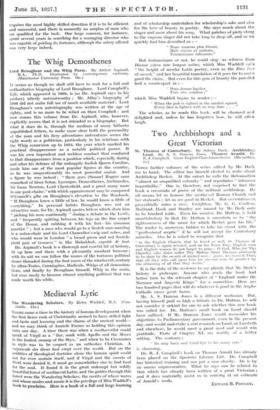The Whig Demosthenes
Lord Brougham and the Whig Party. By Arthur Aspinall, M.A., Ph.D. Illustrated by contemporary cartoons. (Manchester University Press. 18s.) ft seems as though we shall still have to wait for a full and authoritative biography of Lord Brougham. Lord Campbell's Life, which appeared in 1869, is (as Dr. Aspinall says in his preface) utterly untrustworthy ; Mr. Atlay's biography of 1906 did not make full use of much available material ; Lord Brougham's own autobiography was written at the age of eighty, and is no more to be relied on than Campbell ; and now comes this volume from Dr. Aspinall, who, however, explicitly avows that it is not intended as a biography. But what it does do is, through the medium of many hitherto unpublished letters, to make more clear both the personality of the man and his fiery adventures (adventures seems the right word) as a politician, particularly in his relations with the Whig connexion up to 1834, the year which marked his practical disappearance as a notable political power. It was his own imprudent and reckless conduct that conduced to that disappearance from a position which, especially during and after his defence of the unhappily foolish Queen Caroline, made him one of the most popular figures in the country, as he was unquestionably its most powerful orator. And a figure he was indeed : " there goes (Samuel Rogers once remarked of -him)--Solon, Lycurgus, Demosthenes, Archimedes, Sir Isaac Newton, Lord Chesterfield, and a great many more in one post-chaise," with which appraiseinent may be compared O'Connell's gibe on Brougham's elevation to the Woolsack, " If Brougham knew a little of law, he would know a little of everything." In personal habits Brougham was not an attractive man, for Dr. Aspinall quotes letters which show him picking his nose continually " during a debate in the Lords, and " frequently spitting between his legs on the fine carpet of the House, • and rubbing it with his feet—his common practice " ; but a man who would go to a Scotch race-meeting in a sedan-chair and his Lord Chancellor's wig and robes, and who would wear in London " a broad green and red Scotch- plaid pair of trousers " is, like Habakkuk, capable de tout.
Dr. Aspinall's book is a thorough and careful bit of history, lit up here and there with a pleasantly mordant humour ; with its aid we can follow the mazes of the tortuous political dance threaded during the first years of the nineteenth century by ultra-Tories, Canningites, Radicals, Whigs of all denomina- tions, and finally by Brougham himself, Whig in the main, but ever ready to become almost anything political that was made worth his while.














































 Previous page
Previous page